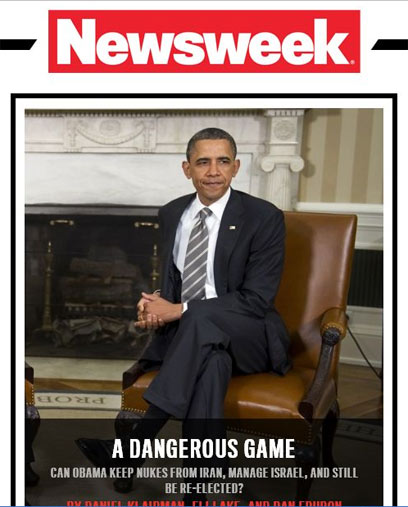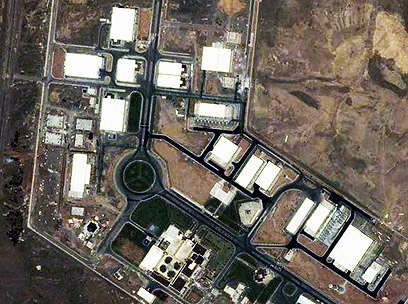
WASHINGTON – "Obama’s Dangerous Game with Iran" – that is the name chosen by Newsweek magazine, which this week explores the internal conflict within the American administration regarding the Iranian threat.
The feature also delves into the intricate relationships between Israel and the US on the matter, suggesting that both sides are, at times, not as forthcoming with each other as it may seem.
Related stories:
- 'Obama convinced Bibi to give Iran sanctions time' Obama: Israel hasn't made decision on Iran
- 'All Iranian facilities are vulnerable'
The magazine quotes Pentagon sources as saying that for the most part, the US prefers to "look the other way" when it come to Israel's covert operations against Iran, especially when it comes to the assassination of Iranian nuclear scientists.
Newsweek presents a basic question: Can US President Barack Obama "keep nukes out of the mullahs’ hands, prevent the global economy from imploding, manage the wild card that is Israel – and get reelected"?

The cover of Newsweek
The mistrust between Washington and Jerusalem regarding Iran dates to "well before Obama moved into the White House," the report said, citing an Israeli source as saying that Jerusalem was – and to some degree still is – concerned about the fact that Obama views Iran "in the context of a broader non-proliferation policy… the Israeli factor did not play prominently."
Washington has made its reservations clear – "The White House doesn’t want Israel to start a war – not yet, anyway," a senior administration official told Newsweek.
Mossad Chief Tamir Pardo's recent trip to DC was meant, according to a US official privy to matter, "to take the pulse of the Obama Administration and determine what the consequences would be if Israel bombed Iranian nuclear sites over American objections."
The magazine's source said that Pardo raised many questions, including: "What is our posture on Iran? Are we ready to bomb? Would we (do so later)? What does it mean if (Israel) does it anyway?"
Israel, the report said, has essentially ceased sharing a "significant amount of information" with the US regarding its military preparations for a possible strike.
Keeping up appearances
Newsweek compared Obama's situation to three-dimensional chess, saying that he must find a way to keep Iran from obtaining nuclear weapons, prevent the oil-based global economy from plunging into chaos and "manage the wild card that is Israel."
"Israel’s national interests are not always in line with Washington’s, and a messy war – or perceived weakness on Iran – could tip the election for the Republicans in November," the report said.

Iranian nuclear facility (Photo: EPA)
Obama insists that the financial sanctions imposed on Iran "have serious bite," but in the event of an Israeli attack on Iran "United States may get drawn into a war that could set the Middle East further aflame and send global markets into a terrified frenzy."
Meanwhile, it seems both Israeli and American intelligence officials expressed concerns that Obama "might put an end to an elaborate shadow war they had been waging" – referring to the covert cooperation between the Bush administration and Israel, meant to set back Iran’s nuclear development.
Obama eventually listed to his advisers and decided to that he would pursue both the covert and diplomatic paths simultaneously.
Still, the magazine noted that while the US and Israel usually enjoy a strong relationship on security and intelligence matters, they differ on the question of strategy, citing that while Israel has no qualms about assassinating Iranians involved in nuclear research, the US law forbids it.
"The Israelis handled everything that was kinetic, and we did the nonkinetic activities, sometimes along with the Israelis… When it comes to assassinations and industrial 'accidents'… the Israelis don't want to say and we don't want to know," a Pentagon source said.
These legal delicacies, the source added, are the reason US intelligence officers are "always careful about what we said to the Israelis in meetings, and they knew why… We often held things back from them – satellite imagery and other kinds of intelligence that could have helped them with their activities."
Adding to the mix is the well-known frosty relationship between Obama and Prime Minister Benjamin Netanyahu. The differences regarding the need for an operation in Iran have only increased tensions.
Still, according to the magazine, Israeli officials now believe that Obama "has undergone a positive evolution in his views on Iran"
"Today, when you listen to Obama ... you get the feeling the Americans are ready to attack if worse comes to worst," an Israeli source said.
- Receive Ynetnews updates
directly to your desktop















